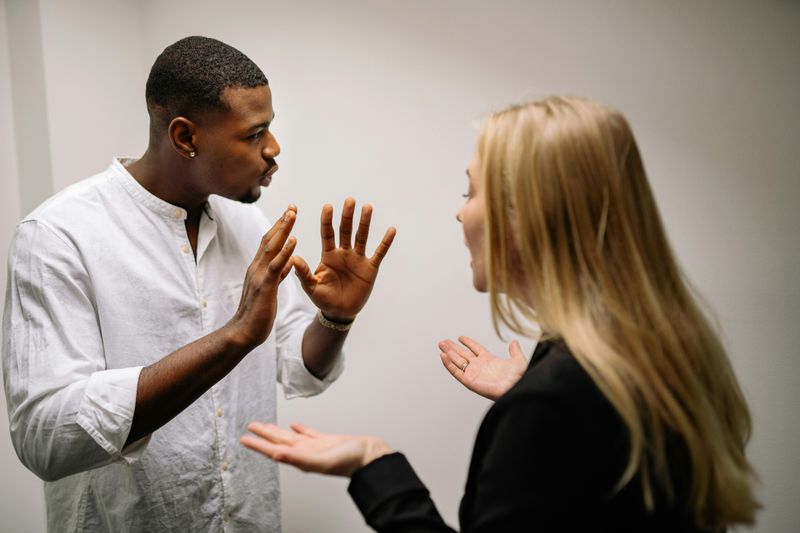15 Signs You’re Giving Too Much in a One-Sided Relationship

Every healthy relationship thrives on balance. Whether it’s friendship, family, or romance, there’s a natural give-and-take that makes both people feel valued. But what happens when you’re the one giving your all, while the other person barely lifts a finger? That’s when a relationship stops feeling like a partnership and starts feeling like a chore.
1. You’re Always the One Initiating Contact

When was the last time they reached out first? If you can’t remember, that’s a sign. A balanced relationship shouldn’t make you feel like a telemarketer begging for attention.
Think about it: if you stopped texting, calling, or checking in, would you even hear from them? If the answer is “probably not,” you’re carrying the weight of staying connected. It’s natural to want to talk to someone you care about, but when the effort is always one-sided, it starts to feel like you’re chasing a ghost.
Relationships are supposed to be mutual. If they never take the time to ask how your day is going or surprise you with a simple “thinking of you,” you might just be investing in someone who isn’t investing in you.
2. You Make All the Plans

Ever notice you’re the one picking the restaurant, setting the date, and making sure everything actually happens? That’s not romantic initiative—it’s unpaid event planning.
Of course, it’s normal to enjoy organizing things if that’s your style. But if your partner or friend can’t be bothered to take the reins even once, it signals a lack of interest. Relationships require participation from both sides, and planning is part of that.
When you’re constantly creating the opportunities to see each other, it can feel like you’re dragging them along for the ride. A little effort—like suggesting a movie or setting aside a day for you—goes a long way. If they can’t manage that, it may be time to rethink who you’re scheduling into your life.
3. They Rarely Compromise

Does everything revolve around their schedule, their taste, and their comfort zone? If so, compromise is missing in action.
Compromise doesn’t mean keeping score, but it does mean both people adjust at times to meet in the middle. When one person consistently calls the shots, the other ends up sacrificing far too much. That’s not partnership—it’s dictatorship with a smile.
Maybe they refuse to eat at a restaurant you love, or they act put out if you suggest trying something new. If “my way or no way” is their default, you’ll always be the one bending. Over time, that leaves you not only resentful but also exhausted. Relationships should bring joy, not feel like a constant negotiation you’re destined to lose.
4. You Feel Drained Instead of Fulfilled

Relationships should recharge you, not leave you emotionally bankrupt. If spending time with them feels more like a chore than a joy, you’re giving too much.
Notice how you feel after you part ways. Do you feel happy and connected, or do you feel like you’ve been through an emotional marathon with nothing to show for it? When you consistently walk away feeling depleted, that’s a giant red flag.
Healthy relationships create space for laughter, growth, and mutual support. If you’re left mentally exhausted while they carry on as if everything’s fine, it’s a sign of imbalance. At some point, you have to ask yourself: is the time and energy you’re pouring into this relationship worth what you’re actually getting back?
5. Your Efforts Go Unnoticed

Have you ever gone out of your way to do something thoughtful, only for it to barely register with them? It stings, doesn’t it?
Whether it’s cooking a meal, remembering small details, or giving heartfelt support, these actions deserve recognition. They don’t need to throw you a parade, but a genuine “thank you” or acknowledgment is the least they could offer. When appreciation is missing, it can feel like your efforts vanish into thin air.
Everyone wants to feel valued in a relationship. If the person you’re with consistently overlooks your contributions, it signals not only imbalance but also a lack of respect. You deserve to be seen for the love and energy you’re giving—not taken for granted like background noise.
6. They Expect Support Without Offering It Back

Being someone’s rock can feel rewarding—until you realize they’re never around when you need a shoulder yourself.
Support should flow both ways in a relationship. You listen to their problems, cheer them on through struggles, and encourage them when they doubt themselves. But when the tables turn and you’re left to deal with your challenges alone, resentment builds. You shouldn’t have to beg for basic emotional support.
A partner who leans on you constantly but disappears when it’s your turn to need help isn’t showing love; they’re showing dependence. A true relationship is a safe space where both people can lean on each other. If it feels like you’re their therapist instead of their equal, you’re giving far too much.
7. Your Needs Take a Backseat

It’s one thing to occasionally let someone else’s needs come first—it’s called compromise. But it’s another thing entirely when yours are always brushed aside.
When you find yourself constantly shelving your preferences, goals, or desires to accommodate theirs, you stop being a partner and start being an accessory. This imbalance may show up in big decisions—like where to live—or small ones, such as what to watch on Netflix.
The problem isn’t the occasional sacrifice; it’s the pattern of silence around your needs. If you’ve become accustomed to their wants being the default, you’re losing sight of your own voice. Healthy relationships honor both people’s priorities, not just the louder or more demanding one.
8. You Feel Like You’re Walking on Eggs

Tension should not be the defining feature of your time together. If you constantly censor yourself or tiptoe around sensitive topics, the relationship becomes emotionally suffocating.
It’s natural to avoid unnecessary fights, but when you can’t express yourself freely without fear of backlash, you’re in dangerous territory. This type of imbalance often creeps in subtly—you start holding back little by little until you hardly recognize yourself.
Instead of being authentic, you’re performing to keep the peace. That’s exhausting, and it’s a clear sign you’re giving too much of yourself to maintain harmony. Relationships thrive on honesty and vulnerability, not on pretending everything is fine while you’re quietly swallowing your frustrations.
9. You Give More Financially

Money can reveal a lot about balance in a relationship. If you’re always reaching for the check, buying the gifts, or covering shared expenses, it can feel like you’re being used.
Of course, generosity is a beautiful trait. But when giving becomes expected rather than appreciated, it crosses into unhealthy territory. If your partner has the means to contribute but chooses not to, that’s not generosity—it’s exploitation.
Financial imbalance often signals deeper issues of respect and reciprocity. It’s not about keeping tabs down to the penny, but it is about fairness. If you’re silently carrying the financial burden while they enjoy the benefits, you’re not just paying in dollars—you’re paying with your peace of mind.
10. They Don’t Show Genuine Interest in Your Life

Conversations shouldn’t feel like monologues where you’re the audience and they’re the star. If your stories, dreams, or struggles barely register with them, it’s a sign they’re not invested.
You deserve someone who asks how your day was and actually listens to the answer. Someone who remembers the little things you share and checks in about them later. Genuine interest is one of the simplest but most powerful ways to show love.
When curiosity is missing, you’re left feeling invisible. That kind of neglect chips away at your sense of importance in the relationship. Don’t settle for someone who treats your life like background noise—they should want to know you fully, not just surface-level.
11. You Feel Guilty for Asking for More

Asking for what you need should not feel like a crime. If you hesitate to voice your desires because you fear being seen as needy, there’s a serious imbalance.
Relationships thrive when both people can speak openly about what makes them feel loved and supported. If your requests are consistently dismissed or twisted into accusations, you start shrinking yourself to avoid conflict. That guilt isn’t a reflection of you—it’s a reflection of how little they value your needs.
You should never feel bad for expecting reciprocity. Love is not a one-way street. When guilt replaces comfort in expressing yourself, it’s time to question whether this relationship is truly meeting your emotional needs.
12. They Keep Taking Without Giving

One-sided relationships often reveal themselves through a lopsided pattern: you give, they take, repeat. This could mean emotional energy, time, or tangible favors. At first, it may feel rewarding to help, but over time you notice the lack of balance.
They accept your kindness without hesitation but rarely reciprocate. The problem isn’t in giving—it’s in the absence of return. Healthy relationships don’t operate like ATMs, where one person endlessly withdraws.
They thrive on mutual generosity and consideration. If you’re pouring into someone who never refills your cup, it’s not love—it’s depletion. Pay attention to whether they’re capable of giving back, or if they’ve grown comfortable with always being on the receiving end.
13. You’re the Emotional Caretaker

It’s exhausting to always be the one soothing their stress, calming their anger, and building their confidence. At some point, you start to feel more like a parent than a partner.
Everyone has moments of needing reassurance, but when the balance is heavily skewed, you’re left carrying their emotional baggage while neglecting your own. It’s a draining cycle where you’re always the fixer, the problem-solver, and the comfort provider.
While empathy is a strength, it shouldn’t cost you your peace. A true partner doesn’t rely on you to hold their world together—they learn to share the responsibility of emotional well-being. If your role has turned into permanent caretaker, you’re giving far too much of yourself away.
14. You Fear Losing Them More Than They Fear Losing You

The thought of them leaving keeps you up at night, but they seem completely secure—or worse, indifferent. That imbalance is not love; it’s control.
When one person holds all the power in a relationship, the other bends over backward to keep them happy. This often leads to ignoring red flags, tolerating poor behavior, and staying in situations that don’t serve you.
Fear of abandonment makes you cling tighter, while they enjoy the security of knowing you’ll never walk away. But love isn’t about fear—it’s about trust and equality. If the relationship only survives because you’re terrified of losing it, then it isn’t a healthy bond; it’s an unhealthy attachment.
15. You Question Your Worth

Perhaps the most damaging effect of a one-sided relationship is the toll it takes on your self-esteem. Over time, you begin to wonder if you’re the problem, if you’re not enough, or if you’re unworthy of love.
That kind of doubt is corrosive. It eats away at your confidence and convinces you to accept less than you deserve. Instead of uplifting you, the relationship leaves you second-guessing your value.
But here’s the truth: your worth isn’t defined by how someone else treats you. A balanced relationship should affirm your value, not diminish it. If you’re left questioning your self-worth, it’s not a sign you’re lacking—it’s a sign they’re not giving what you deserve.

Comments
Loading…